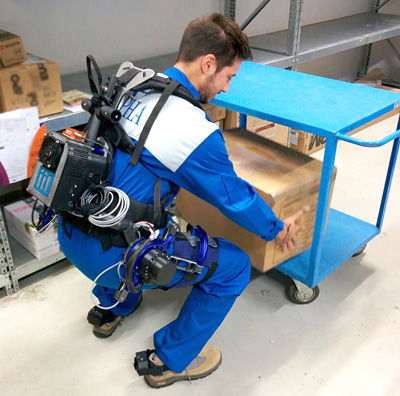Intense PC2 for the robotic exoskeleton RoboMate!
May 08, 2017The European project RoboMate developed the first exoskeleton "full body" which greatly facilitates the manual handling of heavy workload for operators in the industrial and warehousing sectors.
Globally, work accidents cost European businesses about 4% of their GNP. Across Europe, it is estimated that more than 25% of workers have experienced low back problems related to manual management of heavy workloads. By reducing the impact on the muscular-skeletal system, RoboMate minimizes the risk of muscle problems putting safety and work rehabilitation as an essential feature in the workplace.
Human-Machine Cooperation
RoboMate is a modular exoskeleton which consists of 3 modules, a trunk and a control interface (HMI). Each module can be used independently or together with other modules, depending on the activity of the operator, giving the later a higher flexibility.
The trunk module was developed by the Department of Advanced Robotics of the Italian Institute of Technology (IIT) with the objective of reducing the load’s impact on the worker's back by applying an assistive torque at the hip that you can see on the picture below.

The module reduces the muscle force of the worker's back by applying an assistive torque at the hip.
Intense PC2 chosen for Freedom of Movement
For the development of prototype, the Italian Institute of Technology (IIT) has chosen our Intense PC2 for its robustness, passive dissipation, compactness and low power consumption.
Intense PC2 i7 offers great performance (dual core Intel i7-4600U processor) in a very compact form factor (19cm x 16cm x 4cm) and a small weigh (around 1 kg). The PC is extremely rugged and completely silent, as it is passively cooled using fanless technology. A set of features that made it an optimal choice for the robotic RoboMate project.
"The biggest challenge was to develop a system that is comfortable to wear and that transmits effectively assistive torque operator" commented Jesús Ortiz, member of the Development Team of RoboMate at IIT.
We have developed several prototypes of the system to test and study how the operator could interact with the system, which in turn had to be fast enough to ensure a certain freedom of movement while being able to forward assistive torque. Lightness, then, and even weight distribution on the person's body to minimize the pressure points, naturally in total safety.
In the first prototypes, when the exoskeleton software was still not optimized, we wanted a powerful and robust solution that would allow the system to run smoothly.
The software, developed on traditional x86 computer worked "out of the box" on Intense PC2, so the transition from the external computer to the on-board computer was completely transparent, without any transitional problems or code conversion.”
Which Future for RoboMate?
The RoboMate project is in the final stages. The Italian Institute of Technology is currently testing the system in industrial environments, and the preliminary results show a significant advantage of the work of the operators.
Given the impact of this project and the interest of the various industrial sectors, IIT is preparing to launch several projects to keep up with developments. This project has opened the way for several other proposals for EU projects that will be presented in a near future by some partners who have worked on RoboMate.
RoboMate Partners: The project includes 12 partners from the industrial to academic field, coming from 7 different European countries. The consortium includes leading experts in the field, creating a unique formula that allows to take on the challenges involved in the design and development of exoskeletons for industrial applications: accelopment AG (CH), Centro Ricerche Fiat S.c.p.A.(IT), Compa S.A. (RO), Fraunhofer-Gesellschaft zur Förderung der Angewandten Forschung e.V. (DE), Güdel AG (CH), Indra SAS (FR), Istituto Italiano di Tecnologia (IT), MRK-Systeme GmbH (DE), Ropardo SRL (RO), The Netherlands Organization for Applied Scientific Research (NL), University of Limerick (IE), Zurich University of Applied Science (Coordinator).
Download the Full Story or discover the Fanless Intense PC chosen by the Italian Institute of Technology.
 Part of
Part of